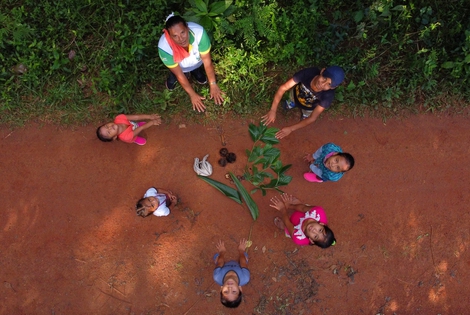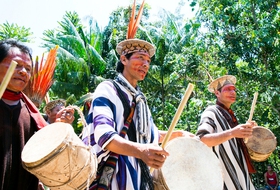
The Amazon became an alternative classroom during the pandemic. Now, the educational forest in Batraja, Bolivia, lives on to teach children and adults the value of nature.
The European countries foster illegal deforestation around the world, despite they are among those who violate international laws and conventions the less. In order to meet the demand of agricultural products in Europe, between 2000 and 2012, the equivalent of a soccer field was illegally deforested every 2 minutes, violating national laws of those countries
The European countries foster illegal deforestation around the world, despite they are among those who violate international laws and conventions the less. In order to meet the demand of agricultural products in Europe, between 2000 and 2012, the equivalent of a soccer field was illegally deforested every 2 minutes, violating national laws of those countries that boasted forests in their territory.
The Stolen goods: the EU’s complicity in illegal tropical deforestation study, by the Dutch NGO Fern, alongside the exposition of a 2014 research by Forest trend, evaluates for the first time data taking into account economic factors and the amount of deforested area.
75% of the products that reach Europe after the non-authorised deforestation go to the Netherlands and Germany, which are characterised by a high demand of palm oil; to France, which is the major importer of soy for animal feed production; and to the United Kingdom, which hosts livestock raised after deforestation.
Italy is the first country for imported goods, due to the high demand of leather destined to the production of accessorizes. The Netherlands import the major amount of agricultural products responsible for the broadest deforested area, due to the presence of large international harbours. Imported products come from Brazil (nearly 50%), Indonesia (25%) and Malaysia, followed by Paraguay, Argentina and Uruguay.
“We urgently need an action plan to homogenise EU policies on agriculture, trade, and energy, in order to reduce consumption and guarantee the legal import of sustainably sourced raw materials,” affirms Saskia Ozinga, campaign coordinator for Fern.
The NGO, established in 1995 for protecting forests and populations’ rights, asks through its report the European Union to use its commercial influence to push governments to carry out reforms in order to reduce illegality, since the commitment of organisations and grass roots is not enough. The European Union is in the front line for combating global warming; it therefore should not avoid the problem of trade and consumption of raw materials deriving from deforested areas that before were rich in trees absorbing CO2.
Siamo anche su WhatsApp. Segui il canale ufficiale LifeGate per restare aggiornata, aggiornato sulle ultime notizie e sulle nostre attività.
![]()
Quest'opera è distribuita con Licenza Creative Commons Attribuzione - Non commerciale - Non opere derivate 4.0 Internazionale.
The Amazon became an alternative classroom during the pandemic. Now, the educational forest in Batraja, Bolivia, lives on to teach children and adults the value of nature.
Our species took its first steps in a world covered in trees. Today, forests offer us sustenance, shelter, and clean the air that we breathe.
100,000 mink will be culled in Spain after testing positive for coronavirus. Meanwhile, the Netherlands abandons mink farming completely.
The dog meat festival in Yulin – where ten thousand cats and dogs are butchered – is taking place this year, notwithstanding the coronavirus pandemic.
Bangladesh suffered widespread damage as a result of Cyclone Amphan. Yet the Sundarbans mangrove forest acted as a natural barrier protecting the country from further destruction, as it has done countless times before.
On top of a 2.4 million dollar compensation, the indigenous Ashaninka people will receive an official apology from the companies who deforested their lands in the 1980s.
The tapir was reintroduced into Brazil’s Atlantic Forest, the country’s most at-risk ecosystem. The species can play a key role in the forest’s recovery.
Forests are home to 80 per cent of the world’s terrestrial biodiversity. This year’s International Day of Forests highlights the urgent changes needed to save them.
Joaquin Phoenix, who won Best Actor at the 2020 Oscars, reminded us that we need to overcome our egocentric view of the world, and rather choose love and compassion towards others and the natural world.







